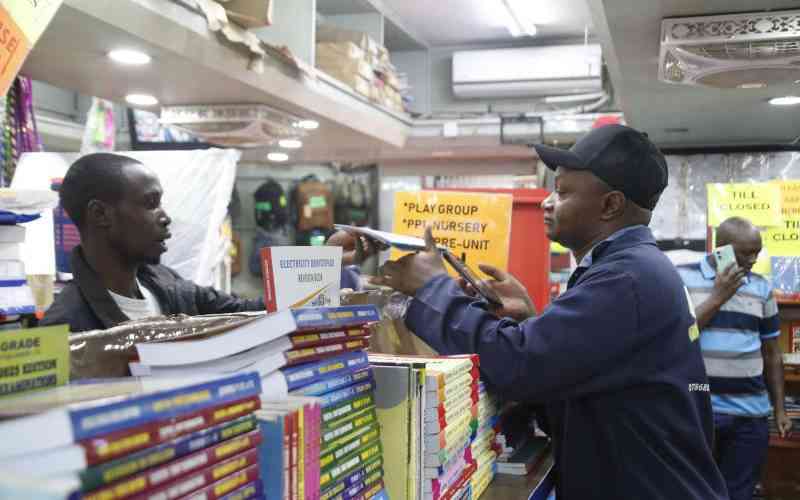A parent shopping for books at Savanis Book Centre on April 28, 2025 as schools resume class for Second Term Learning. [Kanyiri Wahito, Standard]
Walk into any bookshop in Nairobi, Kisumu or Nakuru, and you will find the same story written not in the pages but on the price tags: books have become unaffordable for the average Kenyan.
A children’s storybook costs as much as a kilo of meat.
A high school set book can swallow half a day’s wages for a casual laborer.
Follow The Standard
channel
on WhatsApp
A full set of secondary school textbooks is easily worth more than a boda boda rider’s monthly fuel budget.
For many families, the question is no longer what to read, but whether they can afford to read at all.
This is not because Kenyans don’t value education. Far from it. Parents sell cows to keep children in school.
Families cut meals to pay exam fees. But when it comes to books; arguably the most essential tool of learning; policy and economics have joined hands to shut the door.
The single biggest culprit is taxation. The government, in its hunger for revenue, slapped a 16 percent Value Added Tax (VAT) on books.
Let that sink in. In a country that constantly chants about ‘knowledge economy’ and ‘competency-based learning,’ books are treated the same way as luxury perfumes and imported whiskey.
In effect, Kenya taxes learning.
That one policy decision has transformed bookshops into museums.
The middle class can still browse shelves, but for the majority, books are now luxuries. University students huddle around photocopiers, producing grainy black and white copies of chapters because the original text costs the equivalent of a week’s food budget.
Parents in rural Kenya are forced to share a single dog eared textbook among five children.
And libraries; once a proud equalizer of opportunity; are starved of new materials, reduced to recycling outdated volumes that no longer match the curriculum.
The cost is not just economic; it is generational. Literacy thrives on access.
A child who owns storybooks grows not just in vocabulary but in imagination, empathy and confidence.
But today, too many Kenyan children graduate primary school never having owned a book outside the syllabus.
Their reading culture begins and ends with exams. Their understanding of literature is reduced to cramming set texts and spitting them out in KCSE. This is not education. It is survival.
Consider this: according to recent market surveys, the price of imported children’s books in Nairobi ranges between KSh 700 and KSh 1,500 each.
A Kenyan teacher in a rural school earns as little as KSh 30,000 a month. H
ow many books can such a teacher realistically buy for their own children, let alone recommend for students? Compare that to countries like South Africa, where reading campaigns are subsidized by government and books are zero rated for tax. The gap is glaring.
But VAT is only part of the story. The publishing industry itself is suffocating. Publishers complain of high printing costs due to imported paper and ink, both heavily taxed.
Local writers struggle to get published because publishers cannot afford to take risks on books that may not sell in a market strangled by poverty.
Piracy thrives in the shadows, filling the gap left by legitimate books, yet robbing authors of income. The result is a vicious cycle: books are too expensive to buy, too costly to produce, and too risky to publish.
The consequences ripple far beyond classrooms.
A nation’s literacy is its lifeline. Farmers who cannot access manuals on modern agriculture remain trapped in outdated methods.
Youth without affordable access to books struggle to navigate an increasingly digital world where literacy is power.
Adults cut off from books are cut off from lifelong learning, civic engagement and innovation. In short, when books are priced out of reach, so too is progress.
Kenya loves to boast about being an ‘education hub,’ but the truth is raw: we are taxing away the very foundation of that dream.
The future of literacy cannot be left to NGOs distributing donated novels or to parents who must choose between a book and a plate of ugali. The government must take bold, deliberate steps to reverse this crisis.
First, scrap VAT on books. Knowledge should never be treated as a taxable luxury.
The revenue collected from taxing books is a drop in the Treasury’s ocean, but its impact on literacy is catastrophic.
Second, subsidize local publishing. Cut taxes on printing materials, support local authors, and give schools incentives to stock locally produced storybooks and readers.
Third, revive libraries. A modern library in every county is not a luxury; it is a necessity if we want an informed, literate citizenry.
Books are not handbags. They are not perfumes. They are not optional extras for the wealthy.
They are the very bricks of nationhood. To tax them is to cripple an entire generation before it can stand.
To price them beyond reach is to guarantee a future of inequality where only the privileged read and the rest are condemned to ignorance.
Kenya must decide what it values more: short term tax revenue or long-term national intelligence. One fills the Treasury for a day; the other builds a nation for a century.
Right now, our policy choices are ensuring that in a land of 50 million people, books remain locked behind glass; displayed, admired, but unread.
A country without affordable books is a country without readers. And a country without readers is a country without a future.
Raphael Ng’ang’a is a seasoned teacher of English, writer and trainer passionate about literacy, education reform and the power of words to shape society.
Follow The Standard
channel
on WhatsApp
By Raphael Ng’ang’a


